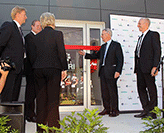New Imaging Centre to bring sharper focus on disease
A new Magnetic Resonance Imaging (MRI) centre boasting the most advanced scanning technology in the Southern Hemisphere was opened today at the Hunter Medical Research Institute in Newcastle NSW, Australia.

Professor Warwick Anderson AM, Chief Executive Officer of the National Health and Medical Research Council, officially cut the ribbon on the $6million facility which is devoted exclusively to medical research.
It is already in full-time demand from University of Newcastle and Hunter New England Health staff, along with collaborating research groups from around Australia and abroad.
Adjoining the HMRI Building on the John Hunter Hospital campus, the HMRI Imaging Centre houses a Siemens Magnetom Prisma 3T MRI unit, the first of its kind in Australia, along with an Agilent pathology magnet and an EEG device to measure electrical activity of the brain.
The University of Newcastle purchased the Siemens scanner to join an elite group of world-renowned, top-tier research institutions using the cutting-edge technology.
Hunter Medical Research Institute Director Professor Michael Nilsson said the centre will now give researchers fast access to MRI scanning, relieving pressure on hospital services and saving time.
"It can take researchers days, even months, to get MRI time because of pressing clinical needs," he said. "With our own magnet we can now do more research, we can diversify into other areas, break new ground with publications, and we won't have to impact on the hospital system to do so.
"As a dedicated tool for research, we think the Siemens is the best of its kind in the world. We also have world-leading expertise among the team to fully utilise its power and precision."
Deputy Vice-Chancellor (Research) at the University of Newcastle, Professor Kevin Hall, said the University's partnership with HMRI was key to its ambition to make research available to the community.
"We are committed that our research should drive real innovation. HMRI is the perfect partner to take our research from the bench to bed side," Professor Hall said.
"This facility will allow the University to further develop its already extensive capabilities in priority research fields as diverse as cancer, dementia, post-traumatic stress disorder, substance abuse, pain, food addiction, sports-related concussion and stroke. With eminent researchers like Professor Carolyn Mountford, we are truly world-class in these fields."
As Director of the University of Newcastle's Centre for MR in Health, and Professor of Radiology at Harvard Medical School, Professor Mountford and her team have served as a world-wide development unit for Siemens Healthcare.
Her ongoing research is delving into the chemical changes associated with breast disease, through to monitoring changes to brain chemistry resulting from chronic pain, repetitive head injury and post-traumatic stress disorder.
"From helping soldiers returning from deployment, to monitoring women at risk of developing breast cancer, MR technology is incredibly versatile," Professor Mountford said. "New MR techniques are being developed to allow us to push boundaries further."
Mr Jeff Connolly, Chairman and CEO of Siemens Australia, said the Magnetom Prisma was the most powerful clinical research magnet in Australia, with Siemens investing around $5billion each year on R&D.
"Siemens is unique in that we realised early on that the technology can't reach its full potential in the factory. To really advance human health we need partnerships like this with HMRI and the Newcastle University, where the best technology is combined with Australia's leading medical research minds and an unmatched local support network of Siemens scientists and fellows."
The Agilent 400MHz MR spectrometer supplements the Siemens scanner by allowing researchers to perform precise chemical analyses on biopsy samples. Among its uses, Professor Mountford says it can identify whether a breast tumour has spread to lymph nodes from the chemistry of the primary tumour.
"Agilent is proud to be at the opening of the new HMRI Imaging Centre," said Rod Minett, General Manager for Life Sciences Group, South Asia Pacific and Korea region, Agilent Technologies.
"With the Agilent MR system installed in this facility, we believe it will further boost HMRI's leading-edge capabilities in cancer research, and we look forward to continuing this close working relationship with the team."
Site enabling works commenced in August 2013, with specialist construction firm ACEPT Design assembling the prefabricated modules. Construction funding and scoping stemmed from the original HMRI Building project which was completed in 2012.
A second MR scanning facility with connecting atrium is planned for a later construction phase, subject to funding availability.
HMRI is a partnership between Hunter New England Health, the University of Newcastle and the community.
Contact
- Mark Rothfield, HMRI.
- Phone: +61 2 4042 0590
Related news
- Launch of the School Students’ Statement on the Right to a Healthy Environment
- Funding boost to technology for lower emission steel
- Newcastle team on mission to improve childhood cancer outcomes
- Shanae’s passion for caring delivers her dream to work in health
- Food and nutrition degree serves Keren a rewarding career
The University of Newcastle acknowledges the traditional custodians of the lands within our footprint areas: Awabakal, Darkinjung, Biripai, Worimi, Wonnarua, and Eora Nations. We also pay respect to the wisdom of our Elders past and present.